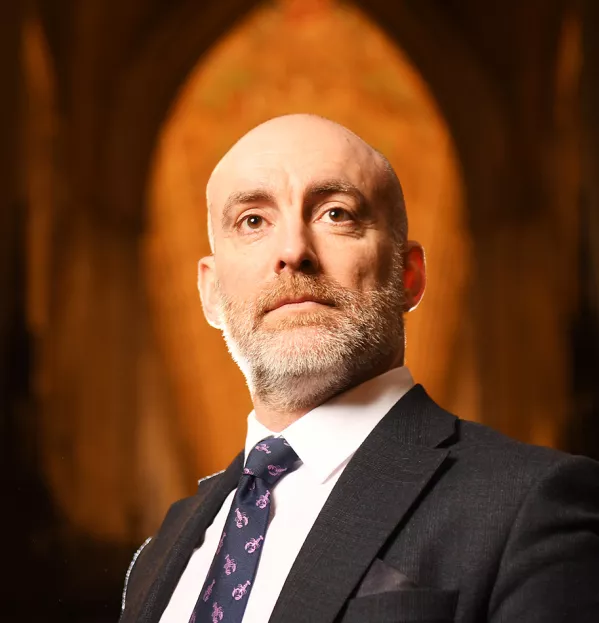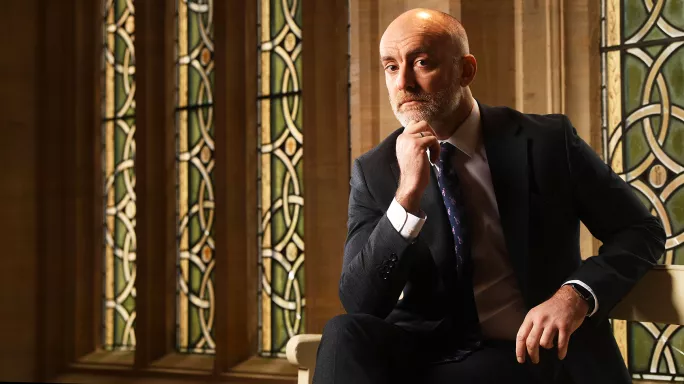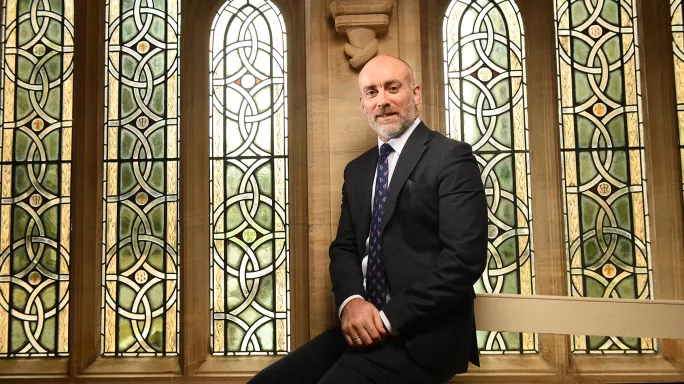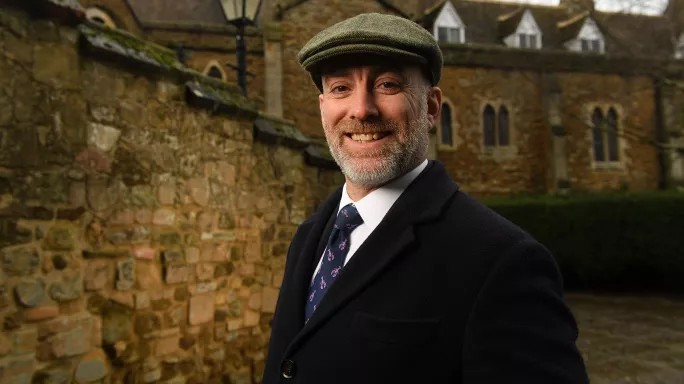- Home
- Leadership
- Strategy
- 10 questions with...Adrian Ball
10 questions with...Adrian Ball

Adrian Ball is the chief executive of the Diocese of Ely Multi-Academy Trust, a trust with 40 schools across East Anglia that he has led since August 2019, having started his career as a PE teacher in 2003.
Answering Tes’ 10 questions, he chats about how his career was transformed when a now high-profile figure took over as his new head, why his leadership skills evolved thanks to some tough feedback from a coach, and why primary funding models have to change to bring more stability to the sector.
1. Who was your most memorable teacher at school and why?
It was my Year 7 teacher, when I was in the last year of my middle school. He was called Mr Bewick.
Up until that point I was a bit of a rascal, not working particularly hard and so on. But Mr Bewick used sport to push me and had high expectations of me, and that gave me those expectations of myself, which teed me up really well for secondary school.
2. What were the best and worst things about school?
When I moved into secondary school the access to sport was brilliant. I enjoyed it but the school - a small, rural comprehensive in Norfolk - wasn’t that well renowned for sport and so we never had any fixtures with other schools.
I loved science and geography, and the way the teachers worked with us enthralled me in terms of wanting to know more. I liked school really, and that stemmed from the push I got from Mr Bewick.

The worst was the careers advice - it was appalling. There was a computer program where you typed in some questions and it gave you an answer. I got “fish farm manager”. That was the sum total of the careers advice.
3. Why do you work in education?
Initially it was by accident. I was doing a sports science degree at university and a rugby team I was playing for did some outreach work with children and asked if we could do some coaching. It was really good fun.
I was in my third year and thinking about what was next and thought, “I am enjoying this so I’ll sign up for a PGCE.” I did that in Norwich. Then I got a job here and I’ve been here ever since.
Why I am still in education, though, is because of the impact that we can have on young people. I would say the first five years of my career I was going in and teaching and really enjoying it but that was it - I never realised the wider impact that we could have.
More Tes’ 10 questions:
- Lorrayne Hughes, chief executive of Cumbria Education Trust
- Moira Marder, CEO of the Ted Wragg Trust
- Baroness Wilcox, Labour’s education whip in the House of Lords
But in 2010 our school was academised and the new head came in [Dame Rachel De Souza, the current children’s commissioner for England]. She appointed me as her deputy and working with her, I saw how much more of a wider impact you can have as school leader on the lives of the children and their families.
That culture of raising expectations within a school was transformational and changed how I thought about my role and its influence beyond just teaching a subject.
4. What are you proudest of in your career and what do you regret?
I’m most proud of the headship at Thetford [The Thetford Academy and East Point Academy]. The school had gone into special measures a few months prior to me being appointed and within 15 months we had taken it to a “good” rating.
In my first staff meeting I had given my big state-of-the-nation talk and a member of staff said, “That’s all well and good but children from here can’t do that,” and that really irked me.
So a big thing was shifting culture and perceptions of what pupils can achieve - all going back to what Mr Bewick did with me.
In terms of regret, the way I led back then. I was really arrogant, a bit of a steamroller approach, which at the time felt right but, with hindsight, it wasn’t. I cringe when I think of things I said or did.
I had to learn that you can achieve more through consensus and bringing people along with you, still with urgency if you need it, but with more awareness of how you deliver.

That change all came because I went to a business course and the mentor sat me down and gave me some hard truths about my style and lack of self-awareness.
It was really hard to hear but it was what I needed.
5. Who would be your colleagues in your perfect staffroom?
It’s people committed to putting children first, ahead of their own egos. I think we can allow our own philosophies or ideologies to take precedent over what’s actually in the best interests of children.
So the ideal staffroom is where people hold on to their principles tightly but not too tightly, so that if in the educational discourse a better idea comes along that’s proven to work and steeped in the right research, we are able to shift and adapt.
6. What are the best and worst aspects of our school system?
The best is the work happening in multi-academy trusts where there are big systemic challenges to the education system around mental health or attendance or the curriculum. You’ve got trusts taking that on, making changes and being willing to share those insights with others.
The worst - the special educational needs and disabilities system doesn’t work. Parents are battling to get their children’s needs recognised, schools are battling to meet those needs, given the funding contexts, and local authorities are struggling to cope with the demands of increasing numbers of education, health and care plans because funding isn’t sufficient.
No one doesn’t want to support these children but the way the system is set up means local authorities, schools, parents and so on end up battling each other because there isn’t enough to go around. It’s a vicious cycle.
7. Who in education has influenced you the most?
Definitely Dame Rachel de Souza. It was such a step change between the school we were in and the school she was head of - the expectations she had of us, the children, of what can be achieved. That constant drive to do more was transformational.

It shifted my whole approach to education from being about what was in front of me to being about that wider impact. She’s still there now if I need a bit of advice on the phone. I don’t think I’d be where I am without her drive and support.
8. If you became education secretary, what would you do?
In terms of the national funding formula, I would look to rebalance the disparity between primary and secondary funding per pupil.
There was the story about the Diocese of Bristol Academies Trust, where a secondary got rebrokered and suddenly the other schools - all primaries - were not financially viable. There were discussions elsewhere about MATs talking about how they don’t charge, or are reducing, the top slice for primaries, because secondaries can cover them.
So you’ve got MATs with the entire funding model predicated on secondary schools propping up primaries - yet at the same time we’re talking about having nursery provision in primary schools, about the importance of the early years stage, of early reading. Yet we fund them £1,500 less per child. If we rebalance the funding, the overall amount would stay the same but you could invest a lot more in early years.
9. What will our schools look like in 30 years’ time?
The boring answer - they won’t be much different. I think we’ve evolved the way we talk about cognitive science and pedagogy, and that’s become more developed as we’ve realised the importance of how we sequence our curriculum, and that may keep evolving.
But bar the usual technological changes, I think the core purpose of our schools is teaching, and having teachers who know a lot about their subjects and want to pass that knowledge on and guide children. That will always have a place.
10. What are the most important lessons you’ve learned doing this job?
Listening. As I’ve developed as a leader, I’ve realised that I need to need to listen to my team more because that’s why I’ve appointed my team - they’re experts in their fields, so you need that ability to sit back and listen to them.
Adrian Ball was talking to Dan Worth
You need a Tes subscription to read this article
Subscribe now to read this article and get other subscriber-only content:
- Unlimited access to all Tes magazine content
- Exclusive subscriber-only stories
- Award-winning email newsletters
Already a subscriber? Log in
You need a subscription to read this article
Subscribe now to read this article and get other subscriber-only content, including:
- Unlimited access to all Tes magazine content
- Exclusive subscriber-only stories
- Award-winning email newsletters
topics in this article



